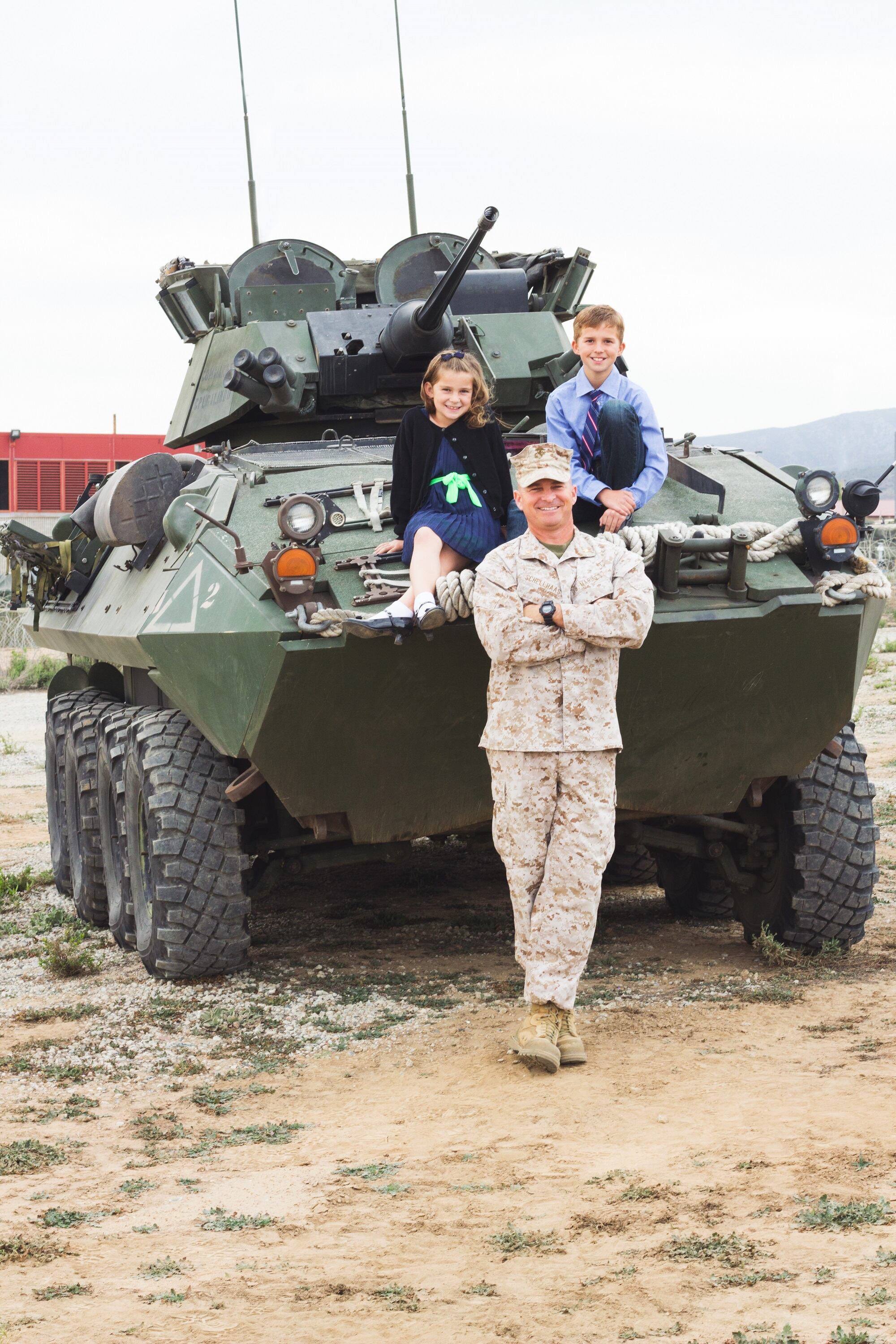Maj. Ross Schellhaas has loved being an infantry Marine for more than two decades, but this past March he dropped his retirement papers.
It was a tough choice. He turned down his promotion to lieutenant colonel and the possibility that he could soon command an infantry battalion.
"The purpose of me getting out really comes down to my own limitations. I, personally, am not able to be a good father and good Marine," Schellhass told Marine Corps Times. His two children — ages 8 and 12 — are central to his decision.
"I have missed out on a fair amount of my kids' development and growing," he said. "I think both my wife and kids have sacrificed a lot. One night I came home at 19:30 and my 11-year-old son said, 'Wow, you're home early.' When your kids are saying that, you know you are missing out on their lives."
That's why, he says, he's no longer willing to take on the responsibility and make the total commitment required to be a battalion commander and to be entrusted with the lives of up to 1,000 Marines. "There are several incredible leaders that can, I'm just not one of them," he said.
After going on terminal leave in October, Schellhaas retired on Nov. 30.
"Had I made the decision to stick around for lieutenant colonel, I think I would have done well, doing my best to accomplish the mission and ensure my Marines were trained to the best of my ability," Schellhaas said. "But it comes at a great cost of me not being around to see my kids grow up."
Schellhaas is not alone, not by a long shot: According to Marine Corps officials, 11 lieutenant colonel selects and five selected colonels have turned down promotion for a variety of reasons since 2013. Accepting those promotions comes with an additional three-year service obligation.
Between 30,000 and 35,000 Marines leave the service each year. The Corps says it's meeting its retention goals in terms of quantity, but gauging quality of the Marines who stay is a challenge. Many leaders inside and outside the military question whether the best and brightest troops — especially officers — are choosing to stay or leave.
"We don't know the quality of individuals who are leaving," said Katherine Kidder, a military personnel expert with the Center for a New American Security think tank in Washington.
Former Defense Secretary Ash Carter repeatedly voiced concerns about retention and his belief that the military was at risk of losing its best future leaders. Those worries prompted him to push a two-year effort to modernize the personal system.
"Are we able to keep the very best once we've gotten them?" Carter said on a visit to the Army's Fort Drum when he launched the reform effort in March 2015.
"I need to worry about that and be attentive to that as well because I don't want to lose our best people. I don't want to lose our best skills. And I know I can't take that for granted because you people have lots of choices. You are so good that you have other places in society where you can ply your skills," Carter said.
Carter called on top Pentagon officials and lawmakers to make the military personnel system more flexible and for the promotion system focus more on merit and skills rather than seniority. But that effort faced stiff resistance from inside the military and on Capitol Hill and the long-term impact is unclear.
Traditionally the military services have consistently seen a huge number of experienced troops retire as soon as they hit 20 years. "I think one of the things that you can't replicate is judgment — judgment and leadership skills," Kidder said.
"There are skills you can backfill — you can train someone to be a machine gunner — but the long tail of expertise comes in judgment; in organizational, cultural knowledge," she said.
It's not just the frequent deployments that make troops question their military career. Many have spouses with their own career goals to consider, so the constant moves from one military base to another puts a strain on family life, Kidder said.
"They're getting out not necessarily because of the deployment tempo but because of the PCS [permanent change of station] tempo that is just as unsettling to their families," she said.
For the first time, the Defense Department plans to conduct exit surveys to find out precisely why top performing service members are leaving.
Some top leaders say there is no cause for concern in isolated accounts from officers like Schellhaas.
Retired Gen. James Mattis, speaking to Military Times last year before he was nominated to become President Donald Trump's Defense Secretary, said the small number of lieutenant colonel and colonel selects who have declined promotion "doesn't define a problem either statistically or spiritually."
"This is the normal attrition that results from the unique demands of the service, and certainly those families made a heck of a commitment as their Marine came up through the ranks with all the associated deployments over many years," Mattis said.
Even though retention has varied over time, the Marine Corps "has consistently had the sufficient amount of officers it is authorized to have to meet its mission," said Maj. Garron Garn, a spokesman for Manpower and Reserve Affairs. In fiscal 2016, the Marine Corps retained 3,856 active-duty majors, just seven shy of its goal of retaining 3,863 majors, Garn said. In fiscal 2015, the Corps retained 3,803 active-duty majors out of its goal of 3,822.
"Serving as a Marine officer is extremely rewarding but it is not without its challenges," Garn said. "We will all take the uniform off eventually, and the motivations for leaving service are unique to each individual and it occurs every day from every rank. These departures provide an opportunity for others to step up and assume greater responsibilities, whether that's through assignment, promotion, or retention."

Then-Capt. Ross Schellhaas serving in Afghanistan in 2008. He deployed months after his young son died.
Photo Credit: DoD photo by Sgt. Freddy G. Cantu, U.S. Marine Corps.
NEVER-ENDING WARS
Like most deployed service members, Schellhaas has been at war during important milestones at home. "I missed most of the standard stuff: Five wedding anniversaries, the birth of my daughter. I got my wife pregnant twice before deployments and was not around because I was in Fallujah and Helmand."
Schellhaas deployed to Iraq during the initial invasion in 2003 and fought at Nasiriyah. He then deployed to Iraq again for the first battle of Fallujah in 2004. Shortly after his youngest son died in an accidental drowning, he deployed to Now Zad, Afghanistan.
"My deployment to Iraq in 2004, our battalion lost over 20 personnel," he said. "My deployment to Afghanistan, we lost a similar number. That takes a mental toll on the families, when there is the uncertainty and higher probability that you may lose a loved one than you would on, say, a Western Pacific or Mediterranean deployment."
Schellhaas says he has no problem deploying, and he joined the Marine Corps to fight. But since budget cuts have forced the Corps to draw down from 202,000 to 182,000 Marines, fewer Marines are being asked to do more, he said.
He’s filled his time with combat and non-combat deployments; training missions to California Marine Corps bases such as Twentynine Palms, Bridgeport and Coronado; the "backyard" training; professional military education requirements and other events, like the commanding general’s inspection program and logistics readiness evaluations. That eats away at a Marine's time, leaving most family responsibilities to spouses.
"Even in my tours at School of Infantry, we were training late nights and weekends to ensure we were sending the Marines forward with the tools needed to be successful on the battlefield. Too much was at stake not to devote the lion's share of our time to preparing the Marines for combat," he said.
And the pace is not letting up. Marines are still in Iraq. And for the first time in two years, a Marine task force will deploy to Afghanistan. Other threats are percolating elsewhere, including territorial disputes in the South China Sea, the Syrian civil war, al-Qaida in Yemen and Africa as well as Russia’s aggression in Ukraine, he said.
"With budgets being cut and requirements increasing from what the peacetime norm used to be, I think it was clear, to most Marines that pay attention, that we're going to be very, very, busy for the foreseeable future," he said.

U.S. Marines communicate with their command operation center during a raid on a Taliban headquarters in Afghanistan on Aug. 1, 2008. The Marines are from Foxtrot Company, 2nd Battalion, 7th Marine Regiment. Pictured left to right, top to bottom: 1st Lt Doug Ferreira (Fire Support Team Leader), Captain Ross Schellhaas (Company Commander), LCpl Schultz (Radio Operator), LCpl Branch (Forward Observer), Captain Jon Jordon (Forward Air Controller).
Photo Credit: DoD photo by Sgt. Freddy G. Cantu, U.S. Marine Corps.
MORE MARINES?
Nobody suggests that life in the Marine Corps could or should be easy.
"Serving as a Marine is difficult — from high operational tempos that can include multiple deployments to demanding work requirements — the Marine Corps' history is full of examples of Marines doing more with less," Garn said.
However, Garn said, "if we cut corners by eliminating essential inspections and evaluations, we are doing a disservice to our Marines and our country and potentially compromise mission accomplishment. Marine Corps units deploy based on the needs of the combatant commanders."
The Corps' ultimate goal is to give Marines three months at home for every month they spend deployed, but some Marines aren't getting that. Aviation units currently are averaging about two months at home per every month deployed, and that tempo is expected to remain the same for the immediate future, Garn said.
Marines who want to spend more time with their families have the option of serving in "B-billets," which are often less stressful, or applying for the career-intermission program, which gives service members a three-year sabbatical to pursue other interests, Garn said.
The service offers several programs to Marines and their families on how to cope with stress, parenting issues and how to manage a relationship, he said.
Some of the workload on individuals could reduce if the Trump administration moves to build a bigger Corps. On the campaign trail last year, Trump suggested growing the force by 12,000 Marines, which could full out undermanned units and extend dwell time across the force. It's unclear whether Congress would approve the money required for that increase.
Marine Commandant Gen. Robert Neller and other top generals support the idea of growing the size of the Corps. The fiscal 2017 National Defense Authorization Act calls for adding 3,000 Marines by October, but Congress has not yet approved any funding for the Marine Corps to expand.
"Right now, we’re going to operate on the assumption of following the last order signed by the president of the United States that this is going to happen," Neller said on Jan. 12. "There’s no decision without any risk. So if it doesn’t work out, we’ll adjust."
Neller has said the Corps has a plan for the service to get bigger even it is unclear whether Congress will provide money for more Marines when the temporary budget funding the government expires in April.
If Congress does not pass funding for more Marines, the Corps could move Marines from traditional military occupational specialties such as infantry into jobs that the service will need to fight near-peer adversaries, such as information operations, electronic warfare and cyber operations, Neller said.
Giving Marines more time to spend with their families will require more money and people, but the Marine Corps can only work with the funding provided by elected and appointed civilian leaders, Schellhaas said.
"The Marine Corps will never, ever, say to our civilian leadership, ‘We just can't do that ma'am/sir.’ Marines and sailors have to know that going in, and if they and their families can't adapt then they need to find work elsewhere," Schellhaas said.
"That's what I'm doing."

Between 30,000 and 35,000 Marines leave the service each year for numerous reasons, including wanting to spend more time with their families.
Photo Credit: Used with permission of Ryan Elizabeth Ward Photography.
AT A GREAT COST
As a newly minted second lieutenant, Schellhaas never thought that one day he would turn down a promotion to lieutenant colonel. But that was before he had kids and the country was at war, he said. "I just didn't understand the realities of things when I was a second lieutenant," Schellhaas said.
"What changed was having a family, and the demands (real or imagined) and my ability to achieve balance between mission and family. As I gained more responsibility, and the scale tipped more toward my Marines, my family took a back seat."
Schellhaas' wife, Kristine, said there have been difficult times during the past 15 years, such as when she saw television news footage of her husband’s unit fighting during the Iraq invasion and then didn’t hear from him for two months.
The Marine Corps has been the driving force in Kristine’s life for years. Like many Marine Corps spouses, she found that despite her education and experience working for Fortune 500 companies, employers wouldn’t hire her because they didn’t want to take a chance on hiring a military spouse who might leave within a couple of years.
So she became an advocate for military families as the founder and editor of USMClife.com, which offers information about duty stations, schools and area activities. She recently authored a book, "15 Years of War: How the Longest War in U.S. History Affected a Military Family in Love, Loss, and the Cost of Service," about her relationship with her husband during the wars in Iraq and Afghanistan.
Years ago, when her husband became a Marine officer, she thought the next war would look a lot like Operation Desert Storm in 1991, she said.
"I honestly thought that our future wars were going to be short in duration with little loss of life and a little bit of firepower and everybody is going to go home," she said. "I didn’t realize that this was going to be our lifestyle moving forward."
Even when her husband wasn’t overseas, his schedule was exhausting, she said. He would leave home at 6:30 a.m. and return at 8:30 p.m.
"I don’t know what a peacetime Marine Corps looks like, to be honest," she said. "We were married just after 9/11 and we don’t know what normal family life looks like. We long to see it and that’s why he’s saying goodbye."
"We’ve certainly done our time and it’s someone else’s turn now," she said.

Kristine Schellhaas authored "15 Years of War: How the Longest War in U.S. History Affected a Military Family in Love, Loss, and the Cost Of Service," about her relationship with her husband during the wars in Iraq and Afghanistan.
Photo Credit: Used with permission of Ryan Elizabeth Ward Photography.




